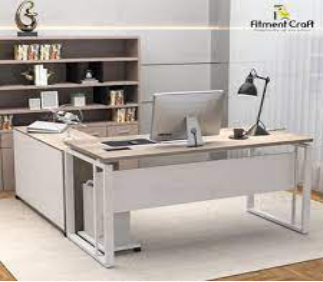The workplace has evolved significantly over the years, and with it, the design of office furniture has transformed. Among the key elements shaping a modern office is the design of office tables, which play a crucial role in promoting productivity, collaboration, and employee well-being. In this article, we’ll explore innovative office table designs that not only cater to functional needs but also contribute to creating a dynamic and inspiring work environment.
Ergonomics as a Priority:
One of the primary considerations in contemporary office table design is ergonomics. The importance of providing a comfortable and supportive workspace cannot be overstated. Adjustable height desks, for instance, have gained immense popularity. These tables allow employees to switch between sitting and standing positions, promoting better posture and reducing the risk of musculoskeletal issues. The flexibility offered by adjustable tables caters to individual preferences, creating a healthier and more adaptable work environment.
Collaborative Workspaces
The shift towards collaborative work culture has led to the emergence of office table designs that foster teamwork and communication. Circular and modular tables have become prevalent, providing a flexible layout that encourages collaboration among team members. Such designs allow for easy reconfiguration of workspace, adapting to different tasks and group sizes. The emphasis is on creating an inclusive atmosphere that promotes idea-sharing and enhances team dynamics.
Space Optimization:
With the rise of remote work and flexible schedules, the demand for compact and versatile office table designs has surged. Space optimization is a key consideration for businesses looking to make the most of limited office space. Folding or nesting tables, which can be easily stored when not in use, are gaining popularity. These designs not only maximize space efficiency but also provide the flexibility needed in a dynamic work environment.
Aesthetics and Brand Identity:
Office tables are no longer just functional pieces of furniture; they also contribute significantly to the overall aesthetics and brand identity of a workspace. Companies are investing in unique and customized table designs that reflect their brand values and corporate culture. From incorporating brand colors to using sustainable materials, these tables serve as visual representations of a company’s identity, creating a cohesive and inspiring workplace.
Sustainable Materials and Design:
As sustainability becomes a focal point in various industries, office furniture design is no exception. Innovative office tables are now being crafted using environmentally friendly materials and processes. Bamboo, reclaimed wood, and recycled materials are gaining popularity as sustainable choices. Beyond materials, the design itself plays a role in sustainability, with modular and easily upgradable tables reducing the need for frequent replacements and minimizing waste.
Technology Integration:
The integration of technology is another aspect shaping modern office table design. With the increasing reliance on digital tools and devices, tables are now equipped with built-in charging stations, cable management systems, and even smart features. Wireless charging pads, for example, eliminate the clutter of cables on the table, creating a cleaner and more organized workspace. The seamless integration of technology enhances efficiency and contributes to a modern, tech-savvy office environment
Personalized Workstations:
Recognizing the diverse needs and preferences of employees, contemporary office table designs are moving towards personalized workstations. Height-adjustable desks and customizable storage solutions allow individuals to tailor their workspace to suit their specific requirements. This not only enhances comfort and productivity but also contributes to a sense of ownership and well-being among employees.
Wellness-Focused Design:
The well-being of employees is a top priority for forward-thinking companies. In response to this, office table designs are incorporating wellness-focused features. Some tables are designed to accommodate ergonomic accessories, such as anti-fatigue mats or balance boards, promoting physical activity and movement during the workday. Additionally, the use of biophilic design elements, such as incorporating natural materials and greenery, contributes to a calming and stress-reducing atmosphere.
Conclusion:
In conclusion, the design of office tables has evolved to meet the changing needs of the modern workplace. From prioritizing ergonomics and collaboration to incorporating sustainable materials and technology integration, innovative office table designs are playing a vital role in shaping a productive, inspiring, and employee-centric work environment. As businesses continue to embrace the importance of a well-designed workspace, the future of office table design promises even more creativity and functionality in enhancing the way we work.

